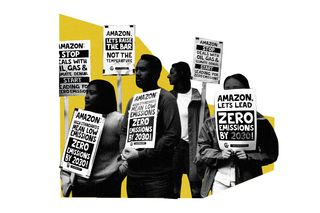
Amazon, Nestlé Among 25 Major Companies Exaggerating Climate Action Efforts: Study
Companies’ ambitious-sounding “net-zero pledges” lack real substance — blurring the line between real climate leadership and greenwashing.

Some of the world’s biggest corporations — the likes of Google, Nestlé, Unilever — are failing to meet their targets for addressing climate change. Worse, they are overestimating and misstating their efforts, further creating dissonance in climate reality, according to a new report.
The context to this is familiar: several companies are publicly claiming to “go green” and cut their emissions to zero in the interest of environmental sustainability. But organizations responsible for a massive carbon footprint are not changing quickly enough; they are instead avoiding credible immediate greenhouse gas emissions cuts. This is a systemic effort to exaggerate climate action through “greenwashing tricks, using loopholes, and omitting data.”
Compiled by the non-profit organizations NewClimate Institute and Carbon Market Watch, the analysis monitored companies on multiple criteria: their individual targets; how much carbon offsetting they planned and how reliable those estimates are; what progress have they made on reducing their own emissions; the level of transparency in disclosing information and sharing targets. Carbon offsetting is a contested practice in conservation; it’s when companies try to compensate for greenhouse gases emitted elsewhere by paying to maintain new forests and grow new trees. All in the pursuit of reducing carbon dioxide.
Many of the companies surveyed claimed to offset their emissions by undertaking “net zero emissions” targets. Now, this is a target scientists say we must reach by 2050 to limit global temperature rise; each company is responsible for setting its own target. Google, for instance, pledges to be carbon-free by 2030, and Ikea had its sight set on being “climate-positive” in eight years.
The initial objective of the report was to explore how corporates undertake “good practices”, but the researchers told BBC News they were “frankly surprised and disappointed at the overall integrity of the companies’ claims.”
Some companies that did reasonably and moderately okay on the metric were Maersk, Vodafone, Apple; those on the “low” and “very low” integrity rating were Amazon, Volkswagen, Nestlé, Google, Ikea, Unilever. Overall, even if the companies continued to commit to and implement current strategies, they would succeed in reducing emissions by 40% at most — a far cry from the 100% decarbonization needed by 2050 to deal with the catastrophic consequences of global heating.
“The rapid acceleration of corporate climate pledges, combined with the fragmentation of approaches, means that it is more difficult than ever to distinguish between real climate leadership and unsubstantiated,” the study noted.
Related on The Swaddle:
Informing About Deadlines for Climate Action Is Effective, Not Alarmist: Study
Or as study author Thomas Day noted: There is a “large gap between what companies say and the reality — and consumers are likely to find it difficult to determine the truth.” Companies like Nestlé, Zara, Coca Cola, Ikea have previously been called out for “greenwashing,” exploitative tactics companies use to claim they are environmentally sound more than they actually are. For instance, Nestle in 2018 said it had “ambitions” to make its packaging 100% recyclable or reusable by 2025. The company was recently named the world’s top plastic polluters — for the third year in a row.
The concern as raised by the report, and greenwashing, is pernicious. Consumers need to be careful to not take these claims at face value. “Companies’ ambitious-sounding headline claims all too often lack real substance. Even companies that are doing relatively well exaggerate their actions,” Day noted.
There remain some important discrepancies in reporting emissions in the first place. 70% of Apple’s climate footprint, according to the report, comes from consumers using electricity while engaging with its broad variety of gadgets. But Apple does not list these emissions as part of its climate change action strategy. This greenhouse gas creation, indirectly linked to the company, is a morbidly common way companies go under the radar.
The other critical pain point in the report scrutinized the route these companies take to achieve net-zero emissions. Here’s the problem with carbon offsetting: companies often use it as a “get out a jail free card.” “It’s like a smoker saying they’ve given up, but paying a healthy person for their clean lungs so they can continue puffing,” explained Jennifer Morgan, executive director of Greenpeace International. The idea is net-zero pledges let companies off the hook without actually scrutinizing the authenticity of their efforts.
Moreover, some experts note that offsetting projects may not amount to much in the long run. “Forestry also makes a poor substitute for immediate emissions cuts as carbon emitted into the atmosphere today begins to heat the atmosphere now and continues to do so for at least a century, while trees take decades to grow and store carbon absorbed from the air,” The Guardian also noted.
“Net-zero pledges that use offsets simply cannot replace needed emissions reductions and fossil fuel phase-out. They all risk human rights transgressions and detrimentally impact already vulnerable communities,” Morgan added.
The template response from most companies to the current report was one of denial; some said they “share different perspectives on some elements of this report” and others found the metrics flawed. Perhaps an encouraging bit in the saga is Ikea’s response to the findings: they encourage “dialogue and scrutiny” of companies’ climate commitments and goals, to ensure that they were “aligned with the science of 1.5°C.”
Arguably, as companies that position themselves as “climate leaders,” these discrepancies are alarming. “It’s short-term action that’s the most important thing, in the climate crisis,” Day said.
Saumya Kalia is an Associate Editor at The Swaddle. Her journalism and writing explore issues of social justice, digital sub-cultures, media ecosystem, literature, and memory as they cut across socio-cultural periods. You can reach her at @Saumya_Kalia.
Related


What Will Protect People From Hate Crimes in the Metaverse?
